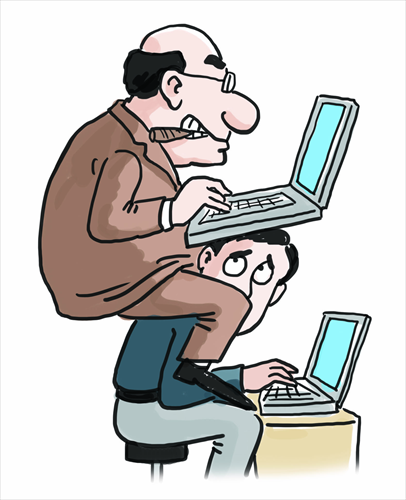HOME >> OP-ED
Online equality is disappearing fast as new barriers go up
By Rong Xiaoqing Source:Global Times Published: 2014-11-13 16:28:01

Illustration: Liu Rui/GT
When Netropolitan, the so-called "Facebook for rich people," announced its birth recently, many people were skeptical. On the Internet, where people are used to a free lunch, can a social media platform that charges $9,000 to join and a $3,000 annual fee to maintain the membership find a niche that will allow it to survive let alone thrive?I have no doubt it will succeed, though, not only because the founder, musician James Touchi-Peters, was inspired by his own unsatisfied need to find similarly high-net-worth people to chat to online, but also because I now firmly believe that anything you can find in the real world will eventually be mirrored in the virtual world.
The idea that the Internet could be better than the real world faded some time ago. Through years of development of the Internet, it has taken on board thieves, perverts, liars and dimwits. They basically do the same things online or offline, stealing, perverting, lying and being fooled, and help make the Internet full of the same vices as in the real world.
But this is not something the Internet should be blamed for, but something to be proud of.
In an op-ed piece published in The New York Times, Vinton Cerf, the vice president of Google who is often considered as the co-father of the Internet, argued it is only a tool to improve human rights but not the rights themselves. Still, he argued, "The Internet has introduced an enormously accessible and egalitarian platform for creating, sharing and obtaining information on a global scale."
Egalitarianism, as an ideal of the inventors of the Internet, is maybe the best value the Net can offer. And the not-so-decent activities of the not-so-decent people on the Net prove that the ideal has at least been partly realized - even they have full freedom to engage.
But this low-level egalitarianism has already been shattered by the fundamental structures of an online society that is growing closer and closer to the offline one.
One of the signs of this similarity is the hierarchy of speech. For those who feel their voices are not heard in the real world, it is getting harder to find listeners on the Internet. Unlike the early days when the posts on the Internet carried more equal weight, now it is those with more "followers" and "friends" or the arbitrary big "V" system of verified and famous users popular in China that dominate.
Research by the University of Georgia in 2011 found that the most popular 2 percent of posters on the Internet harvested 50 percent of all replies, a ratio that seems a bit like the inequality of wealth distribution in the real world. And things have only gotten worse in the past three years.
The impact of self-expressions on the Web is further muffled by the friend circles who find one another online and build ties among themselves. A research released by Pew Research Center and Rutgers University this summer found that people are not willing to share their political opinions on social media if they sense they won't be supported by the majority of the group they are engaging with.
Also, previous studies found that people are likely to group together with like-minded people online, just like they do offline, reducing the opportunity for debate of different opinions. This is basically a situation like the red states and the blue states in the US where individual voters may have little or no impact on the final results in many partisan places.
Now, Net neutrality, the very basic foundation of the Internet egalitarianism, is under attack too. Earlier this year, the US Federal Communications Commission (FCC) announced it was considering a proposal that would allow the Internet providers to slow down or cut the access to content providers who don't pay extra fees. Since then, 3.7 million people have filed comments with the agency to show their opposition, worried the new rules would create a two-tiered world on the Internet that divides the rich from the poor. Even US President Barack Obama chimed in recently to express similar concerns.
But whether the FCC will forego its plan won't change a fact that the Internet is no longer the innocent baby it used to be. It has picked up all the vices out there during the process of growing.
The time that "On the Internet, nobody knows you're a dog" has basically gone. No matter you are a dog or a human, without a known name or a credit card, you'd be barred from more and more games in the virtual world just like in the real one.
The author is a New York-based journalist. rong_xiaoqing@hotmail.com
Posted in: Columnists, Viewpoint, Rong Xiaoqing